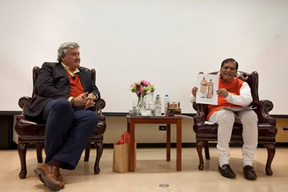
STANFORD, CA: The Sulabh Shauchalaya technology initiated in 1970 is now close to fulfilling Mahatma Gandhi’s dream of eliminating manual cleaning of human excreta and improving the sewage system in India.
This was explained to a select audience here by visiting Founder of Sulabh Sanitation Movement, Dr. Bindeshwar Pathak. Dr. Pathak was invited for a conversation on “Diversity and Inclusive Development: The Sulabh Approach” by Center for Compassion and Altruism Research and Education (CCARE) of the Stanford School of Medicine.
In this dialogue, CCARE’s Founder and Director, Dr. James Doty, asked Dr. Bindeshwar Pathak about his life’s work and what role compassion may have played. An hour-long dialogue followed, ending with questions from the audience.
Dr Pathak explained that the Sulabh Technology ‘two-pit-pour-flush’ has proven scientifically appropriate, economically affordable and culturally acceptable.
While Gandhiji’s political dream of independence of India was realized with agitations, efforts, and sufferings of patriots, and which on international plane influenced U.S. leaders like the late Dr. King and others, Pathak said he was proud of spearheading the cleanliness program of Mahatmaji. It was also heartening that Prime Minister Narendra Modi had taken up the Swacchta Abhiyan in full swing on a national scale.
The Sulabh International social service organization based in New Delhi is engaged in a multi-pronged program to improve the arduous sanitation jobs in the country’s rural and urban areas as also helping several other countries solve their sanitation problems.
In fact, Sulabh was helping the socially and economically disadvantaged groups, common women, ethnic minorities, handicapped and disabled and socially neglected sections like widows. A social sensitivity is a prerequisite to understand the nurturing diversity and taking effective measures to uplift people in distress.
Overcoming the sanitation problem requires a change in the mindset. India cannot progress if it holds back the progress of its marginalized communities – Dalits, Adivasis, Backward classes, common men and women who constitute 70 per cent of its population. The problem of inclusion in India thus assumes a gigantic proportion.
Despite the constitutional provisions of reservations in Government employment, the overall condition of marginalized communities has not recorded the expected improvement. Economic backwardness is rampant in all social groups. The pool of potential candidates in employment positions also keeps increasing. This requires a deeper look in both public and private sectors. We have to also know the subtle biases or prejudices of dominant groups who cause discrimination, which also generates anger and resistance from entrenched groups.
Sulabh has contributed to the cause of a reformed and rejuvenated India through liberation of a large number of scavenging Dalits and their inclusion within the national mainstream. Likewise the toilets, bio-gas plants and other sanitary measures are means to realize Gandhiji’s dream. It needs to be realized that dirty work like cleaning commode does not make the worker dirty. Changing this outlook is a challenging task.
Sulabh has taken up this challenge. Sulabh has jolted people’s conscience and raised the status of untouchables by application of technology and innovation of cultural reforms and social solidarity. To achieve this it was necessary to eliminate bucket latrines that dehumanized occupations.
Dr Pathak said he realized that social and sanitation issues were interlinked and innovated the compost toilet. As a result the upper caste people have started shedding caste bias and practices. Bringing upper caste people to sanitary work is also doing away with prejudices. The restoration of dignity and human rights has taken the shape of a reformist movement. Political democracy is meaningless without social democracy, Dr Pathak added.
CCARE regularly organizes public talks/lectures, scientific conferences, events, research meetings and film screenings aimed at promoting the science of compassion. James Doty, MD is a Clinical Professor in the Department of Neurosurgery at Stanford University and the Director of the Center for Compassion and Altruism Research and Education at Stanford University School of Medicine.
H.N. Verma






